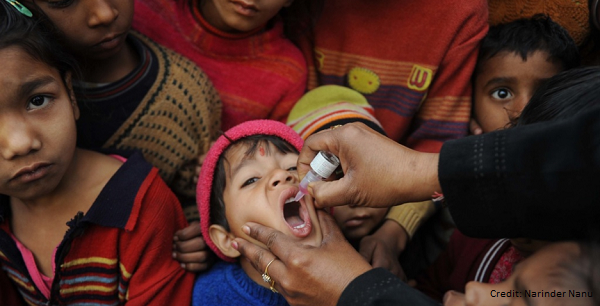
The Right to Health is a Crucial Step to Achieving Universal Health Care
10 June 2019
The Government of India has committed to Universal health care multiple times. With the launch of several schemes like the Pradhan Mantri Jan Arogya Yojana (PMJAY), this commitment has been given tangible form. In its election manifesto for the 2019 Indian elections, the Congress promised to enact a Right to Healthcare Act to guarantee every citizen the right to health care services if they won. This was to cover free diagnostics, out-patient care, medicines and hospitalisation through a network of public hospitals and enlisted private hospitals – similar to PMJAY. Clearly, the government in power and the opposition believe that health care is important.
Several declarations have been made about increasing spending, to no avail – the government has been spending around 1.5 per cent of GDP on health, a far cry from what is required. Higher spending isn’t a panacea, but it is a necessary condition to build adequate health infrastructure. This might include more health facilities in places where people need them the most. According to the World Bank, otherwise poor performing sub-Saharan African countries spend twice the proportion of their GDP than India does. Countries outside South Asia spend a higher proportion of their GDP than India, highlighting how India lags behind in terms of spending.
Consequently, India is one of the worst performers in health outcomes, globally. India’s public health system is paralysed which has led to citizens (both rich and poor) preferring private health care. The costs of health care have been pushed on to individuals and families, which has added to the uncertainty in the lives of the marginalised and in an unequal country, leaving people in a precarious position.
In this context, the fundamental question is: What is the right to health and can making health care a right, push governments to spend more and work towards better outcomes?
What is the right to health?
The right to health is inclusive, and goes beyond merely providing access to health facilities. It includes things like safe drinking water, adequate nutrition, housing, safe environmental conditions, among others. It entails freedom for individuals, such as the right to be free from non-consensual medical treatment (experiments, forced sterilisation, etc.) and from degrading treatment. Furthermore, it contains entitlements including the right to a system of health protection, providing all residents access to essential medicines, basic health services, and related information. Lastly, the right to health should be guaranteed to all socioeconomic groups without discrimination.
The United Nations and WHO define the right to health as the right to the enjoyment of the highest attainable standard of physical and mental health.
How can passing the right to health improve outcomes in India?
Making health a basic right with constitutional backing changes things significantly. Firstly, the government’s priorities change. Enforcing the right to health will require governments to spend a substantial amount on building basic health care facilities. At the moment, the government is not mandated to spend heavily on health – there is no law stating that the government must spend a certain amount on health every year. However, making it a right can bring about the requisite change. The passing of the Right to Education with well-defined norms regarding the distance of a school from habitations, for instance, pushed governments to build more schools in areas that lacked them. Perhaps we can expect something similar on health at the centre and state levels.
Secondly, instituting the right to health locks in multiple governments to the same objective. Governments often avoid planning over a longer time horizon. If the outcome to a project or scheme is only realised after the next round of elections occur, then the government cannot use its work to campaign and get re-elected. Therefore, governments focus on delivering services and schemes that can be completed before the next round of elections. Furthermore, different governments have different campaign promises and priorities. The government today may want to focus on health, but the next government may be more concerned with business and foreign investment. This difference may arise across time, such as the government today and the government tomorrow, or across levels in the same year, such as the central and state governments. However, making health a basic right will guarantee that all governments across levels and time periods have to prioritise health in the short and long-run.
Thirdly, well-defined norms on the right to health will set benchmarks against which the government can be held accountable. This can take the form of clear rules about who is eligible for services, the time period in which the service is to be provided, the minimum quality of that service, among others. In the absence of clear expectations of the government, people are unsure about what to demand as entitlements. However, with clear rules, people know exactly what the government should provide, and can make very specific demands. Constitutional authority backing the right to health will ensure that governments have to deliver.
The right to health care is distinct from the right to health: the latter is wider in scope and definition, while the former focusses strictly on providing certain health services like hospitalisation.
Fourth, the right to health can allow the most marginalised in the country to access health care without falling into heavy debt. The right to health would place obligations on the government, leading to an expansion of public health centres and facilities. By targeting aspects like quality, the right to health could also bring about stricter regulatory practices for both public and private health providers. Good health is a public good – if there are unhealthier people are in an area, the likelihood of diseases spreading increases as well. Therefore, maximum coverage is necessary, and can be brought about by the right to health which focusses on inclusion.
Commitments about universal health care sound great, and are necessary but must be backed by serious legislation. Achieving universal health care is ambitious, and therefore requires a concrete platform and framework from which to build on – something that a well-designed and clearly articulated right to health can provide.
About the Writer
Ritwik is a Research Associate at Accountability Initiative.
The views expressed do not represent an institutional stand.





